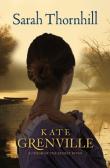 3973791676774568606.jpg
3973791676774568606.jpg
 3973791676774568606.jpg
3973791676774568606.jpg
Sarah Thornhill is the youngest child of William Thornhill, convict-turned-landowner on the Hawkesbury River. She grows up in the fine house her father is so proud of, a strong-willed young woman who’s certain where her future lies.
She’s known Jack Langland since she was a child, and always loved him.
But the past is waiting in ambush with its dark legacy. There’s a secret in Sarah’s family, a piece of the past kept hidden from the world and from her. A secret Jack can’t live with. A secret that changes everything, for both of them.
Kate Grenville takes us back to the early Australia of The Secret River and the Thornhill family. This is Sarah’s story. It’s a story of tangled secrets, a story of loss and unlooked-for happiness, and a story about the silent spaces of the past.
Sequel to The Lieutenant.
 Cultural Memory and Literature : Re-imagining Australia's Past
Leiden
:
Brill
,
2015
11024641
2015
multi chapter work
criticism
Cultural Memory and Literature : Re-imagining Australia's Past
Leiden
:
Brill
,
2015
11024641
2015
multi chapter work
criticism
'Cultural memory involves a community shared memories, the selection of which is based on current political and social needs. A past that is significant to a national group is re-imagined by generating new meanings that replace earlier certainties and fixed symbols or myths. This creates literary syncretisms with moments of undecidability. The analysis in this book draws on Renate Lachmann theory of intertextuality to show how novels that blur boundaries without standing in for history are prone to intervene in cultural memory. A brief overview of Aboriginal politics between the 1920s and the 1990s in relation to several novels provides historical and political background to the links between, and problems associated with, cultural memory, testimony, trauma, and Stolen Generations narratives, which are discussed in relation to Sally Morgan My Place and Doris Pilkington Rabbit-Proof Fence. There follows an analysis of novels that respond to the history of contact between Aboriginal and settler Australians, including Kate Grenville historical novels The Secret River, The Lieutenant, and Sarah Thornhill as examples of a traditional approach. David Malouf Remembering Babylon charts how language and naming defined our early national narrative that excluded Aboriginal people. Intertextuality is explored via the relation between Thea Astley The Multiple Effects of Rainshadow, Chloe Hooper The Tall Man, and the Royal Commission into Aboriginal Deaths in Custody. Kim Scott Benang: from the heart and That Deadman Dance and Alexis Wright Carpentaria reflect a number of Lachmann concepts, syncretism, dialogism, polyphony, Menippean satire, and the carnivalesque.' (Publication summary)
'In 1985, when Kate Grenville’s novel about a fat, unlovely bag lady appeared on the Australian literary landscape, Lilian’s Story was celebrated as a feminist and postcolonial text. By locating Lilian as ex-centric to the nation, to inhabit the abjected zones of the colony—the bush, the asylum, the streets of post-Federation Sydney—Grenville is commonly read as a feminist writer intervening into the gender politics that shaped Australia. Feminists celebrate the ways in which she carves out discursive spaces for women who have existed largely in the interstices between public memory and official history. Postcolonial critical interpretations of Lilian being ‘colonised’ by her father, provoked by the rape narrative, have tended to reproduce the postcolonial trope of Australia’s shift from a colonial relationship to a national structure. Such readings largely neglect the colonial violence of Australian patriarchy, and the skewed gender norms that result when a host culture is transplanted to an imperial outpost. Taking up the colonial metaphor structuring the relationship between Lilian and her father, I read Lilian’s ‘madness’ as a response to discourses of ‘race’ and gender that circulate in the colonial Imaginary to position women as the site for racial anxiety about colonial ‘dirt’, contamination and disorder. While Lilian approaches the rebellious female grotesque celebrated in postcolonial feminist theorising, her obese body also signifies the devouring nature of colonialism. This paper engages with the white politics of women’s ‘belonging’ inscribed in Lilian’s Story to disinter the schizoid nature of white women’s relationship to colonial patriarchy.' (Publication abstract)